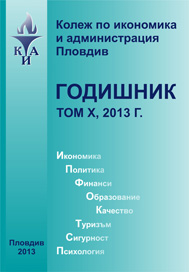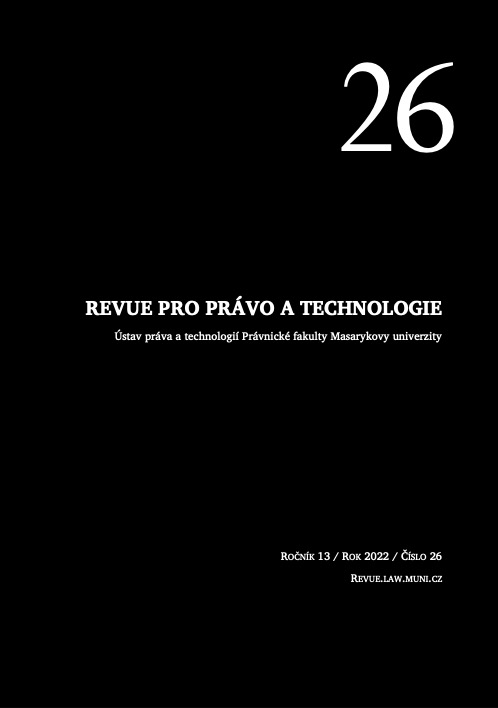
We kindly inform you that, as long as the subject affiliation of our 300.000+ articles is in progress, you might get unsufficient or no results on your third level or second level search. In this case, please broaden your search criteria.

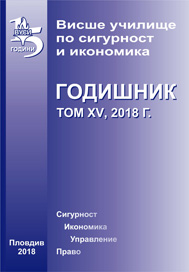
The article reviews and evaluates the international principles for the enforcement of human rights in relation to the control of communication tools. There is an analysis of the changes in the Bulgarian legislation related to the additional possibilities for restricting the freedoms and the rights of the Bulgarian citizens in conditions of threat of terrorist acts.
More...
This article discusses the regulatory framework governing cooperation between Member States in the European Union for the gathering of evidence. The advantages of the European Investigation Order Act, which helps to counter cross-border crime, are analyzed and evaluated.
More...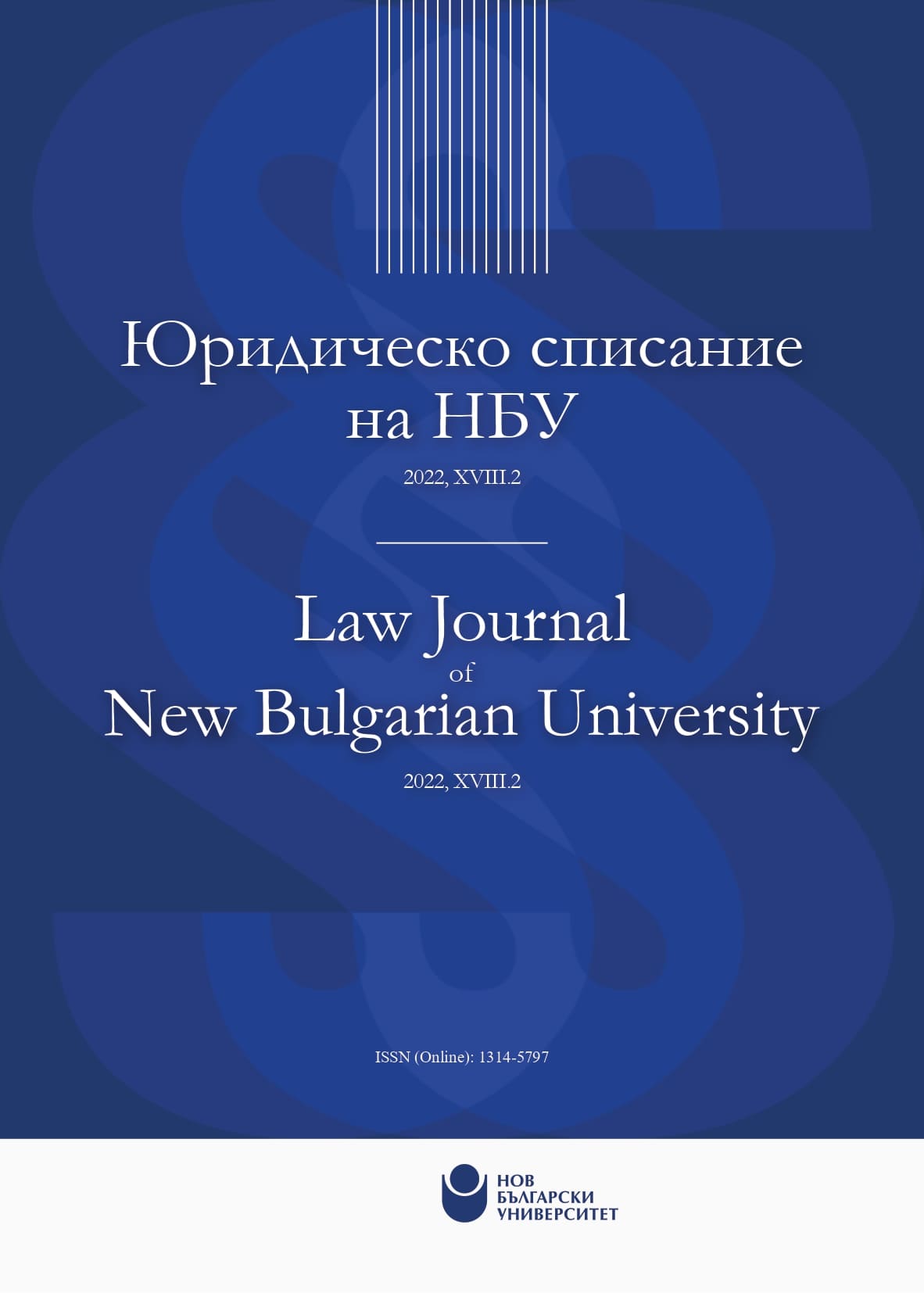
The present study is dedicated to the essence of the concept of “state apparatus”, to the historical and legal analysis of the formation of the central administrations of the executive power in Bulgaria and its development until the adoption of the current Constitution of the Republic of Bulgaria of 1991. It deals with the legal framework concerning the status of the national central public administration and criticizes its shortcomings. The study presents the development of the central public administration over a period of 30 years (1991–2021).
More...
The year of 1866 would represent a challenge for Romanian diplomacy, as by the dethronement of Al. I. Cuza, the great powers would be led to discuss the rescinding of the 1859 act and, implicitly, the return to the political regime which would have caused the two principalities serious damage to their autonomy, both on an internal level, as well as external and it would be met with opposition from the great powers, as the young Romanian national state would meet its major objectives, thus creating a favorable international context in order to acquire state independence.
More...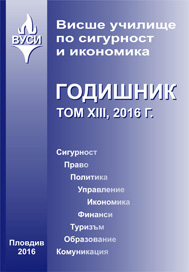
The report examines the role of operational-investigative recognition event in the process of investigating crimes. It looked at the issue of the lack of procedural base regulation procedures for conducting it and mentioned the need to create such resting on the principles enshrined in the Code of Criminal Procedure and tactical rules created by forensics. Operational recognition is multiphase identification process passing through various stages to reach the final result. Due to its essence the same features a number of features associated with a marked subjective nature of why the results and the impact of same on the objectivity of the results of the subsequent procedural recognition.
More...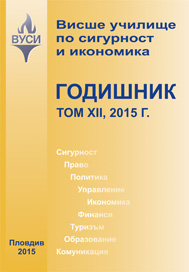
It is obvious that the criminal justice response to serious crime is primarily repressive methods, including primarily the covert activities of law enforcement agencies and the application of methods of secret surveillance, while temporarily restricting the rights and freedoms guaranteed. These tendencies are particularly pronounced since the beginning of the XXI century, and estimates are that in the coming period as the expansion under transnational serious crime, and to increased social response to the same, including of course the instruments of international criminal law and the norms of substantive and procedural criminal law within the state. This paper will provide a review of the modern approach criminal provisions on organized crime, terrorism and serious corrupiton, a review of their compliance with international legal documents, and directions for improvements in the above mentioned areas.
More...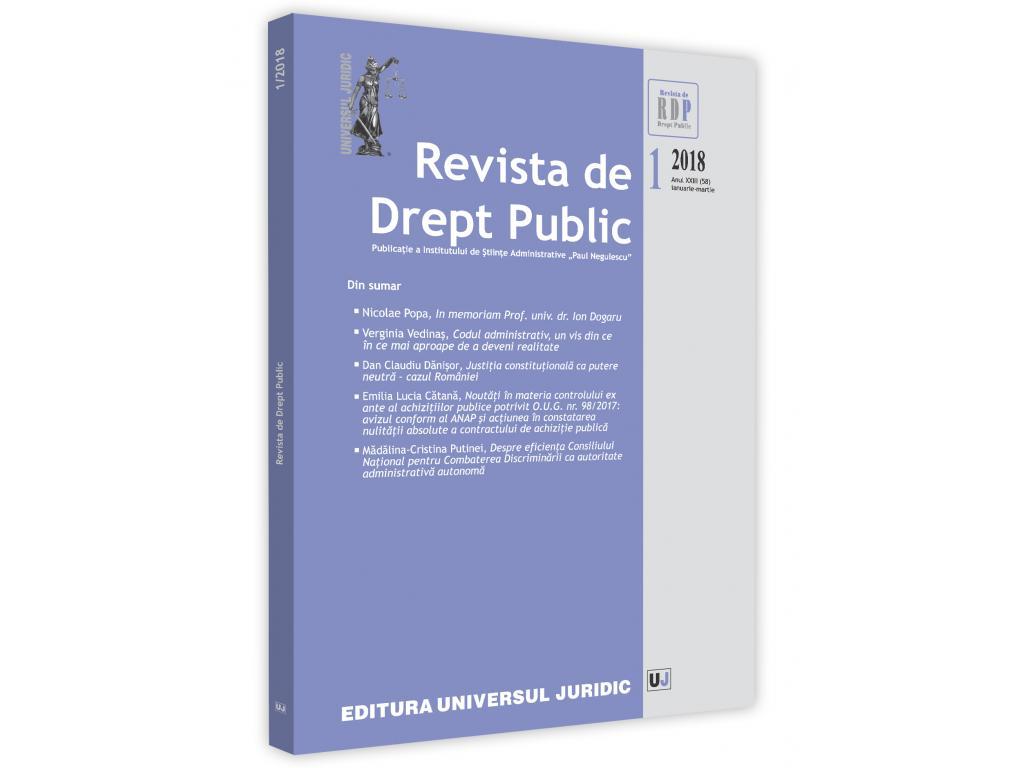
The essential connection between people and their living environment creates a common identity and a level of quality of life based on the shared cultural heritage, built or natural. As an interdisciplinary field, urban planning requires the concerted action of a variety of professionals and stakeholders involved in complex procedures and should be distinguished by its core purpose, to serve and protect the general interests of socIIIiety, through a long-term vision. The field of urban planning and its manner of expression are essentially coordinated through the activity of the public administration. In this context, the latter has the task of ensuring the necessary means for urban planning to achieve its purpose and to contribute to a healthy relationship between people and their living environment.
More...
When analyzing the international legal order it is imperative that one reference the fragmentation-convergence dichotomy. Whether viewed from a historical perspective, drenched in post-colonial sentimentalism, or in a more global manner, leaning towards analyzing international cooperation and dispute resolution, one particular aspect has become irrefutable: fragmentation and convergence are the two facets of this Hegelian dialectic. The aim of this paper is not to analyse the two concepts antithetically, but rather in a complementary manner, our hypothesis being that each actually contributes in shaping the other. To support this analysis, the paper references the relevant case law of the European Court of Human Rights.
More...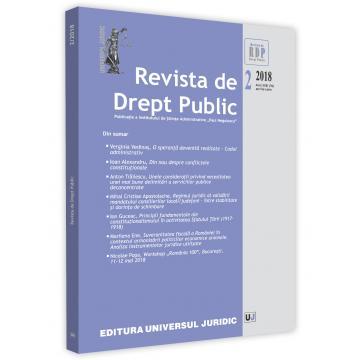
The present scientific approach is an attempt to demonstrate the cohesion between the theory of constitutional law and the socio-political realities of Bessarabia, later called the Moldavian Democratic Republic, in the period 1917-1918. For this purpose, the concept of constitutionalism is considered as the right dimension for generalizations and conclusions on this aspect, especially considering its complexity and its comprehensive character, for the whole range of fundamental social relations. Finally, here are mentioned the intellectual efforts of that time, oriented towards the constitutional foundation of the state organization on the territory of Bessarabia, without any external interference, as well as the value of constitutional law sources from the invoked period, the constituent and indisputable part of national constitutionalism.
More...
The study deals with the involvement of the local authorities of Bessarabia in the process of unification with Romania. The study describes the political activism of the zemstva of Bălţi, Soroca and Orhei counties by voting the motions of unification with Romania during festive meetings, before 27 March 1918, which demonstrates that the unification of Bessarabia with Romania enjoyed the wide support of the local population.
More...
This article provides an analysis of the possible contradiction with the Constitution of the regulations in the Bulgarian Election Code creating a “privilege” for the list leaders in municipal elections as well as for MPs, who are entitled to, according to art. 278 (5) and art. 437 (5), along with their own preferential vote, also to receive the party ballots without any preference in them. Thus, it is obvious that there is a privileged position of these list leaders (while the other candidates are being discriminated against), which puts the aforementioned regulations of the Election Code in contradiction with art. 6 (2) of the Bulgarian Constitution – prohibition of privileges or discrimination, art. 10 – common, equal, direct voting right and art. 4 (1) – rule of law.
More...
Of particular importance for the achievement of the historical act of the Great Union in 1918 was the activity of some great political and statement of the time. A remarkable personality of the Romanian state in this period is Ion I.C. Brătianu. In this study we evoke the personality of the great politician and state and insist on his major contribution to the adoption of the Constitution of 1923 through which the political act of the Great Union received also constitutional significance as well as the legislation adopted on the basis of the Fundamental Law from 1923 through which the Romanian state aligned from the legislative and political point of view to the European states.
More...
Violence has accompanied human development from ancient times to the present days. It is pervasive and multifaceted. As a social phenomenon, it has been the subject of diverse studies aimed at explaining its essence. It is most often seen as the result of an individual’s aggressive behavior directed at another individual. Violence has different forms of manifestation – from different types of mental harassment to physical abuse, which can turn into a crime. Depending on the specific relationships that develop between people, violence most often occurs in the family environment, in the school and in the work environment.
More...
The article examines the establishment of the tax for unmarried and childless persons (bachelor tax) and its historical development during the four Bulgarian constitutions. The problems of the legislative process are being explored, as well as those of the compliance of the bachelor tax with the constitutional and tax provisions, with the principles and objectives of taxation, the fundamental rights and constitutional principles. The article discusses the possibility for the establishment of this tax in modern times.
More...
In the light of the European Parliament elections of 2019, this article proposes an alternative vision regarding the concept of representative democracy in the European Union, and a special focus will be placed on the need to introduce a distinct category of European parliamentarians elected according to certain transnational lists. Representativeness within the European Parliament in Strasbourg is reassessed starting from the need for finding a fair balance between “Europe of the nations” and “Europe of the citizens”, as interdependent positions of a political and legal structure of federalist nature. The article aims at describing the European perspective over the representative democracy as a perspective that conjugates liberalism and communitarianism, recognizing both the individual (citizen), and the collective (national communities corresponding to the member States) as structural elements of the European political order.
More...
Fiscal sovereignty of the Member States is considered to be as one of the fundamental EU principles, as it is unanimously accepted by the doctrine that the states did not transfer the fiscal competency to the European Union. This principle is not explicitly mentioned in the fundamental treaties of the European Union, but it is the result of the interpretation of the provisions from the fundamental treaties. At first, in the article it is analysed the concept of sovereignty in Romania in order to explain the principle of fiscal sovereignty and its limitations adopted at the union level. Fiscal sovereignty is defined, in this article, as the right of a state to determine the content of taxation and fiscal policies independently, without the need for any approval or intervention by another state or external powers. Subsequently, it is included a short review of the fiscal sovereignty as resulted from the interpretation of the fundamental treaties of the European Union and the potential impact on the legislation of the member states. As it is mentioned in the doctrine, the Member States gradually waived their fiscal sovereignty, which was affected by the duties transferred to the European Union in the fiscal area, through various regulations, but especially through the ones establishing the budgetary policy. An important conclusion of this analysis is that the fiscal sovereignty of the Member States is significantly limited by the EU provisions which are not directly regulating taxation principle or taxes.
More...
In zilele de 22-23 martie 2018 s-a desfăşurat la Luxemburg, în sediul Curţii Europene de Conturi, Simpozionul internaţional consacrat finanţelor publice comparate, organizat de Societatea Franceză de Finanţe Publice, la conducerea căreia se află, printre alte multe personalităţi ale vieţii academice şi publice franceze, şi profesorul Aurélien Baudu, de la Universitatea Lille, din Franţa. Tema Simpozionului a fost Le financement public des Parlements en Europe: une autonomie financiere en debat(s) – Finanţarea publică a parlamentelor în Europa: o autonomie financiară în dezbatere.
More...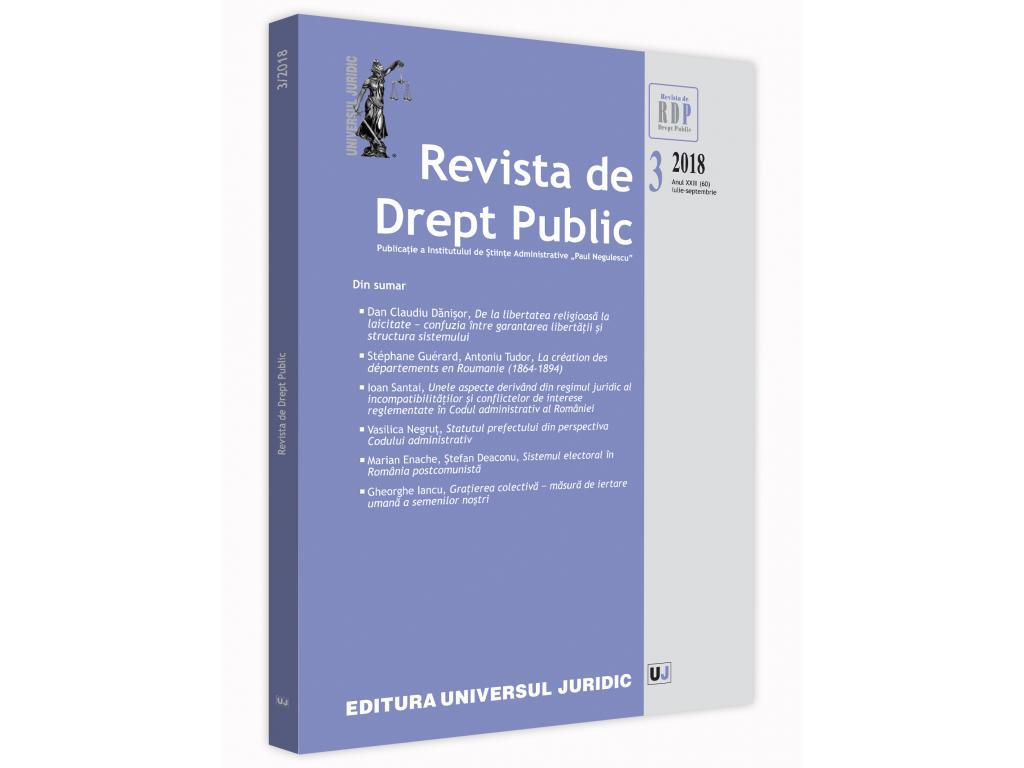
The Constitutional Court has consistently held in its case law that the situations which certain categories of persons are in, must be essentially different to justify the legal treatment difference, and this difference must be based on an objective and reasonable criterion. This solution is also compliant with the consistent case law of the European Court of Human Rights, according to which any difference of treatment, made by the State between individuals being in similar situations, must find an objective and reasonable substantiation.
More...